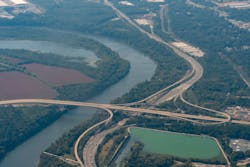Virginia’s $54M Woolridge Road Extension Project to Improve Connectivity in Chesterfield County
Key Takeaways
- Chesterfield County has approved a $42 million contract with Wagman Heavy Civil for the $54 million Woolridge Road extension.
- The project includes a new four-lane divided roadway, a roundabout at Old Hundred Road, and a traffic signal at Route 288.
- A shared-use path and sidewalk will enhance access for pedestrians and cyclists.
A $54 million extension of Woolridge Road in Chesterfield County, Va. is moving ahead after years of planning, with a $42 million construction contract awarded to Wagman Heavy Civil, according to Richmond BizSense.
The project will build a 1.25-mile extension of Woolridge Road between State Route 288 and Old Hundred Road, improving connectivity between the growing communities of Midlothian and Moseley, the outlet reported.
Project Details: New Roadway, Roundabout, and Shared-Use Path
The new four-lane divided road will feature a traffic signal at the Route 288 interchange and a roundabout at Old Hundred Road to improve traffic flow and safety. Crews will also construct a shared-use path and sidewalk along the new stretch of roadway, enhancing pedestrian and cyclist access, according to Richmond BizSense.
Construction is expected to start in December 2025, with right-of-way acquisition already completed, according to a release from the Chesterfield County Government.
During construction, motorists can expect a 14-day closure at the intersection of Woolridge Road and Old Hundred Road, though east-west routes will remain open during the time.
Completion Timeline and Contractor Incentives
The anticipated completion date is July 2028, but the county has introduced a cash incentive program to encourage early completion. Wagman Heavy Civil could receive a bonus for finishing construction between November 2027 and the contract’s end date, helping to minimize traffic disruptions for area drivers, Richmond BizSense reported.
Project funding comes from a mix of state, local and regional funding, with 70 percent of funding provided by the Central Virginia Transit Authority, the outlet reported.
